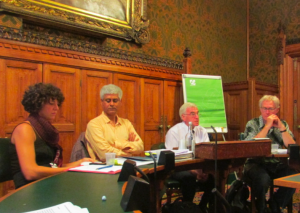
Speakers from Foil Vedanta and London Mining Network yesterday presented evidence in the House of Commons on the criminal behaviour of some London Listed mining companies, and called for better accountability measures and the de-listing of criminal companies. Focusing on contentious UK miner Vedanta Resources, they exposed new evidence of tax evasion, illegal land grabs, displacement, major pollution and water poisoning, as well as the UK’s role in promoting and protecting the company, and called for its immediate investigation and potential de-listing in London.
In a packed meeting hosted by John McDonnell MP in the House of Commons speakers told MPs, journalists, diplomats and members of the public attending that high risk mining companies like ‘the world’s most hated company’ Vedanta Resources are bringing shame on the London Stock Exchange, and demanded better accountability measures and the de-listing of criminal companies. MPs attending were Jeremy Corbyn, Eric Joyce and John McDonnell.
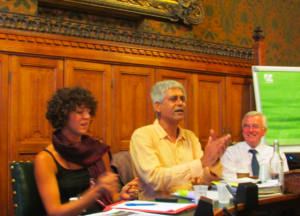
.
Samarendra Das opened the meeting with a movement song from Odisha which the audience joined in with. Das and colleague Miriam Rose from Foil Vedanta then exposed fresh evidence on the criminal activities of Vedanta, including unseen footage of Vedanta’s illegal land grab of Reserve Forest at the sacred Niyamgiri Hills, as well as interviews with people displaced by Vedanta, and now destitute, at Vedanta’s now doomed Lanjigarh refinery.
.
Though Vedanta lost permission to mine the Niyamgiri Hills in January 2014 after a verdict by the Supreme Court forced a referendum to be carried out amongst the tribal inhabitants of the hills, which unanimously rejected the mine, they are currently conducting a consultation on continuing the six fold expansion of the Lanjigarh refinery. The notice for the public meeting they will hold on July 30th claims that bauxite will be sourced 3.5 km from the refinery – intimating that they have not given up on mining the Niyamgiri Hills. In 2005 Orissa Chief Minister Navin Patnaik conceded that the company had illegally encroached over 4.21 hectares of village forest land. The speakers showed footage of villagers who had been force-ably displaced after they had refused to sell their homes, when boundary walls were built around their homes, effectively trapping them. Despite this, Vedanta Chairman and majority owner Anil Agarwal has repeatedly stated at London AGM’s ‘we have not touched a single blade of grass at Niyamgiri’.
.
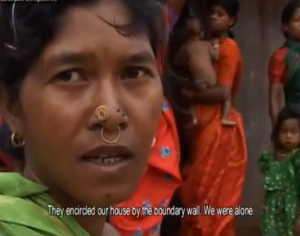
Hundreds were displaced by the factory, promised jobs and compensation if they sold their land to the company. They formed the ‘Vedanta Land Losers’ association when these promises were not met. A 4th July local news article reports that ‘Vedanta displaced have lost all their belongings running after courts. Four are dead, many families shattered.‘ The police have brought false cases against 32 of them in 2006, and a further 12 women in April 2013, who were falsely imprisoned for a month with their children.
New testimonies from communities suffering the intergenerational effects of major water poisoning by Vedanta is Zambia, who have never been compensated http://www.foilvedanta.org/articles/copper-colonialism-foil-vedanta-zambia-report-launched/, and disturbing footage of the 2009 chimney collapse at Vedanta subsidiary BALCO which killed at least 40 people was shown. The Buxi commission report has now found Vedanta guilty of negligence alongside subcontractor SEPCO and the Chhattisgarh state government.
.
Speakers detailed Vedanta’s tax evasion and transfer mis-pricing in Zambia, where a case in the London Court of Arbitration on 2nd July has revealed that Vedanta subsidiary Konkola Copper Mines (KCM) (Zambia) has been using transfer mispricing (by undervaluing ores sold to a hidden subsidiary Fujairah Gold in Dubai) to evade tax in Zambia. Earlier, a video released by Foil Vedanta had revealed Vedanta boss Anil Agarwal bragging to investors that he makes between $500 million and $1 billion at KCM, contrary to claims made by the company that they are making a loss in Zambia and therefore cannot pay tax.
.
Vedanta’s illegal mining in Goa, where the company owe £1.5 billion for illegally exporting 74 million tonnes of iron ore from Goa in 2011/12, was also detailed.
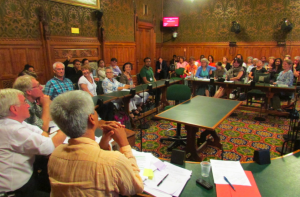 The UK’s role in assisting and protecting this contentious mining company was exposed, including the role of the Department for International Development (DfID)’s CDC (formerly the Commonwealth Development Corporation) in supporting Vedanta’s Zambian mine, and former British High Commissioner to India Sir David Gore Booth’s assistance, as a co-opted board member in launching the company on the London Stock Exchange in 2003. David Cameron’s personal assistance in forcing the Indian government to sell lucrative oil company Cairn India to Vedanta in 2011 was also mentioned. Cairn India are now drilling in the pristine biosphere region of the Gulf of Mannar, Sri Lanka.
The UK’s role in assisting and protecting this contentious mining company was exposed, including the role of the Department for International Development (DfID)’s CDC (formerly the Commonwealth Development Corporation) in supporting Vedanta’s Zambian mine, and former British High Commissioner to India Sir David Gore Booth’s assistance, as a co-opted board member in launching the company on the London Stock Exchange in 2003. David Cameron’s personal assistance in forcing the Indian government to sell lucrative oil company Cairn India to Vedanta in 2011 was also mentioned. Cairn India are now drilling in the pristine biosphere region of the Gulf of Mannar, Sri Lanka.
.
The pattern of human rights abuse, environmental damage and violation of Indigenous Peoples’ land rights among London Listed mining companies was outlined by Richard Solly from London Mining Network, bringing in the mining majors Rio Tinto, BHP Billiton, Glencore Xstrata and Anglo American – all listed in, and theoretically accountable to, London.
.
The speakers highlighted the failure of UK listing rules to prevent poor corporate governance, noting that boss Anil Agarwal owns 69.59% of Vedanta Resources, making other shareholders essentially irrelevant in decision making, and echoed the calls of other investors to ensure a 50% free float requirement for public companies on the LSE. They also noted the role of the many British controlled tax havens in enabling insider trading, transfer mis-pricing and tax evasion on a major scale.
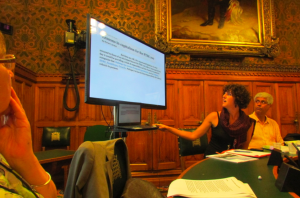 They critiqued the UK’s failure to regulate mining companies or hold them to account. They noted that the UK had refused to sign ILO 169 – the only legally binding international law which recognises tribal peoples’ rights to land ownership, self-determination, and consent over projects that affect them. Speakers also critiqued the UK’s ‘revenue transparency’ initiatives such as the Extractive Industries Transparency Initiative (EITI) – which does not take account of the vast majority of tax evasion which takes place via transfer pricing and tax avoidance schemes, many of which are set up by major accounting firms and use British tax havens.
They critiqued the UK’s failure to regulate mining companies or hold them to account. They noted that the UK had refused to sign ILO 169 – the only legally binding international law which recognises tribal peoples’ rights to land ownership, self-determination, and consent over projects that affect them. Speakers also critiqued the UK’s ‘revenue transparency’ initiatives such as the Extractive Industries Transparency Initiative (EITI) – which does not take account of the vast majority of tax evasion which takes place via transfer pricing and tax avoidance schemes, many of which are set up by major accounting firms and use British tax havens.
.
They also highlighted the ineffectiveness of the OECD complaints system, one of the only routes by which victims of British mining company violations can attempt to hold them to account, showing how several upheld OECD complaints against Glencore and Vedanta have come to nothing.
.
Finally, the speakers recommended that proper accountability measures, and recourse to justice for the victims of criminal behaviours by UK listed mining companies be introduced in London. This should include the independent auditing of company and subsidiary accounts to establish whether tax evasion is occurring.
The speakers called strongly for Vedanta Resources to be immediately investigated, trialled and potentially de-listed from the London Stock Exchange for the catalogue of crimes presented by them.
.
Concern over London’s protection of dubious mining and resource-based companies listed on the London Stock Exchange has been a regular topic in the House of Commons over several years. In 2011 Richard Lambert, the former Director General of the Confederation of British Industries (CBI), told the Financial Times;
‘It never occurred to those of us who helped to launch the FTSE 100 index 27 years ago that one day it would be providing a cloak of respectability and lots of passive investors for companies that challenge the canons of corporate governance such as Vedanta…’
.
Since then there have been parliamentary debates, a consultation on the role of Financial Services Authority, hundreds of Early Day Motions, and even the de-listing of contentious mining company Eurasian Natural Resources Corporation (ENRC) following a Serious Fraud Office investigation which exposed major kickbacks being paid to African leaders. The Department of Business Innovation and Skills is currently carrying out a consultation on the extractive industries sector to establish the need for tighter regulation.
.
Samarendra Das from Foil Vedanta says:
.
“When Vedanta launched on the London Stock Exchange in 2003 they did not have the rights to mine the sacred Niyamgiri hills, nor the environmental or social license to operate at Lanjigarh. Now we should be asking how the London Stock Exchange, JP Morgan, HSBC, and the Financial Times omitted this basic due diligence and gave Vedanta the “cloak of respectability” that comes with a London listing. Perhaps it is time to bring to trial those who are responsible for jeopardising the credibility that the City of London claims.”
.
Richard Solly from London Mining Network says:
.
“London Mining Network believes that mining companies listed on UK stock exchanges need to be regulated much more strictly. We made specific recommendations in the report we published in February 2012 and have repeated that call in the evidence we have presented to the current inquiry into extractive companies by the Select Committee on Business, Innovation and Skills. It is time that the British Government started taking this seriously.”
.
John McDonnell MP, who hosted the talk, said:
.
“We cannot stand by and allow London to be used as the financial base for companies that degrade our planet, exploit their workers and abuse the human rights of extremely vulnerable communities. We need to devise a comprehensive strategy to address this exploitation, on our doorstep. “
.
Participants in the meeting suggested a number of actions to be taken. It was agreed that groups working on the issue would liase on a clear demand which could be used in the upcoming electoral campaigns, and attempt to get parties to include it in their manifestos. Secondly, Vedanta’s AGM demonstration was advertised and the need to use all available strategies to do reputational damage was asserted. The importance of supporting grassroots movements in places affected by mining, and other forms of neocolonialism was also highlighted.